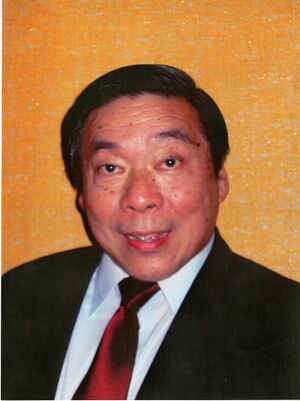Tso-Ping Ma: Difference between revisions
(Created page with "== Biography == Dr. T.P. Ma's pioneering work in gate dielectrics increased integrated circuit operating speed and reliability, lowered cost per function, and raised density by...") |
No edit summary |
||
| (5 intermediate revisions by 2 users not shown) | |||
| Line 1: | Line 1: | ||
== | {{Biography | ||
|Image=6325 - Tso-Ping Ma.jpg | |||
|Associated organizations=Yale University | |||
|Fields of study=Semiconductors | |||
|Awards=Paul Rappaport Award; [[IEEE Andrew S. Grove Award]] | |||
}} | |||
Dr. T.P. Ma's pioneering work in gate dielectrics increased integrated circuit operating speed and reliability, lowered cost per function, and raised density by a significant factor. Gate dielectrics are a critical element in metal oxide semiconductor (MOS) devices, the building blocks of today's silicon chips. Dr Ma, the Raymond John Wean Professor of Electrical Engineering and chair of the Electrical Engineering Department at Yale University in New Haven, Connecticut, recognized early the importance of gate tunneling current in MOS behavior. The semiconductor industry now recognizes this as a major issue in scaling future MOS technology. | Dr. T.P. Ma's pioneering work in gate dielectrics increased integrated circuit operating speed and reliability, lowered cost per function, and raised density by a significant factor. Gate dielectrics are a critical element in metal oxide semiconductor (MOS) devices, the building blocks of today's silicon chips. Dr Ma, the Raymond John Wean Professor of Electrical Engineering and chair of the Electrical Engineering Department at Yale University in New Haven, Connecticut, recognized early the importance of gate tunneling current in MOS behavior. The semiconductor industry now recognizes this as a major issue in scaling future MOS technology. | ||
He is co-author with Paul V. Dressendorfer of "Ionizing Radiation Effects in MOS Devices and Circuits." This has been hailed widely by colleagues as the most authoritative and comprehensive work on the subject. | He is co-author with Paul V. Dressendorfer of "Ionizing Radiation Effects in MOS Devices and Circuits." This has been hailed widely by colleagues as the most authoritative and comprehensive work on the subject. | ||
A Fellow of the IEEE, Dr.Ma is a member of the U.S. National Academy of Engineering and has received the IEEE Electron Devices Society's Paul Rappaport Award. | A [[IEEE Fellow Grade History|Fellow of the IEEE]], Dr. Ma is a member of the U.S. National Academy of Engineering and has received the IEEE Electron Devices Society's Paul Rappaport Award. | ||
[[Category:Dielectrics]] | [[Category:Dielectrics]] | ||
{{DEFAULTSORT:Ma}} | |||
Latest revision as of 20:01, 2 November 2022
- Associated organizations
- Yale University
- Fields of study
- Semiconductors
- Awards
- Paul Rappaport Award, IEEE Andrew S. Grove Award
Biography
Dr. T.P. Ma's pioneering work in gate dielectrics increased integrated circuit operating speed and reliability, lowered cost per function, and raised density by a significant factor. Gate dielectrics are a critical element in metal oxide semiconductor (MOS) devices, the building blocks of today's silicon chips. Dr Ma, the Raymond John Wean Professor of Electrical Engineering and chair of the Electrical Engineering Department at Yale University in New Haven, Connecticut, recognized early the importance of gate tunneling current in MOS behavior. The semiconductor industry now recognizes this as a major issue in scaling future MOS technology.
He is co-author with Paul V. Dressendorfer of "Ionizing Radiation Effects in MOS Devices and Circuits." This has been hailed widely by colleagues as the most authoritative and comprehensive work on the subject.
A Fellow of the IEEE, Dr. Ma is a member of the U.S. National Academy of Engineering and has received the IEEE Electron Devices Society's Paul Rappaport Award.
